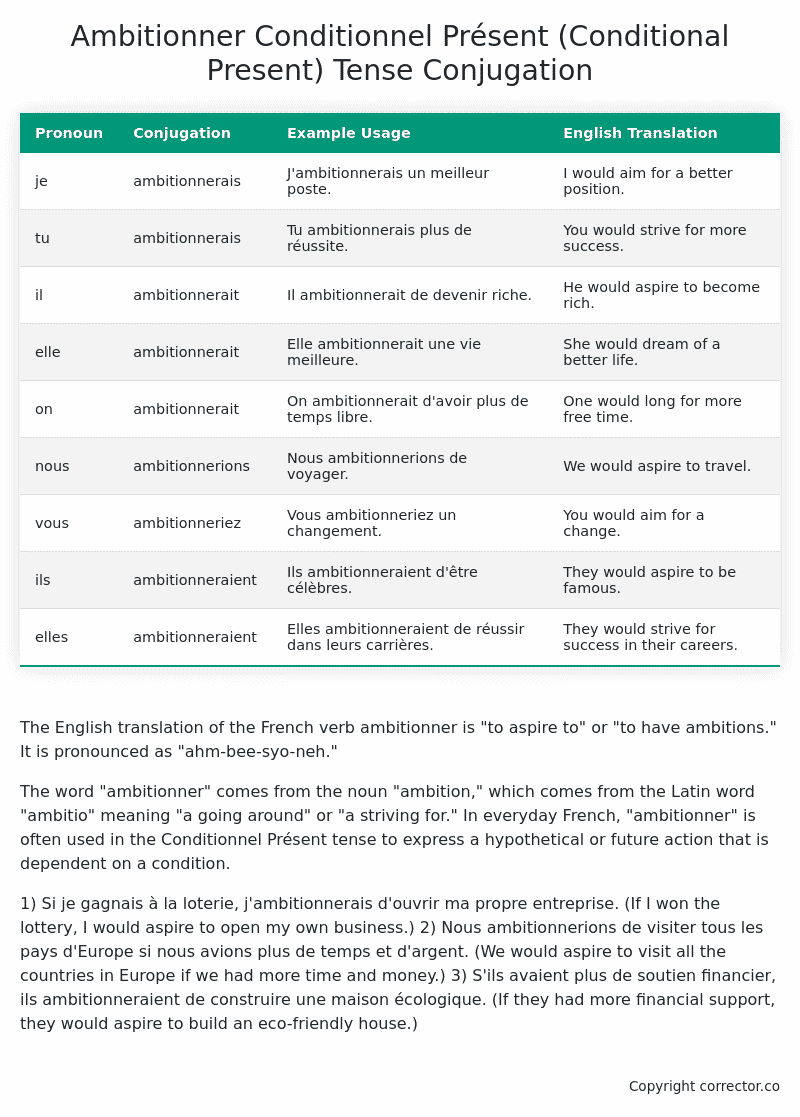Conditionnel Présent (Conditional Present) Tense Conjugation of the French Verb ambitionner
Introduction to the verb ambitionner
The English translation of the French verb ambitionner is “to aspire to” or “to have ambitions.” It is pronounced as “ahm-bee-syo-neh.”
The word “ambitionner” comes from the noun “ambition,” which comes from the Latin word “ambitio” meaning “a going around” or “a striving for.” In everyday French, “ambitionner” is often used in the Conditionnel Présent tense to express a hypothetical or future action that is dependent on a condition.
1) Si je gagnais à la loterie, j’ambitionnerais d’ouvrir ma propre entreprise. (If I won the lottery, I would aspire to open my own business.)
2) Nous ambitionnerions de visiter tous les pays d’Europe si nous avions plus de temps et d’argent. (We would aspire to visit all the countries in Europe if we had more time and money.)
3) S’ils avaient plus de soutien financier, ils ambitionneraient de construire une maison écologique. (If they had more financial support, they would aspire to build an eco-friendly house.)
Table of the Conditionnel Présent (Conditional Present) Tense Conjugation of ambitionner
| Pronoun | Conjugation | Example Usage | English Translation |
|---|---|---|---|
| je | ambitionnerais | J’ambitionnerais un meilleur poste. | I would aim for a better position. |
| tu | ambitionnerais | Tu ambitionnerais plus de réussite. | You would strive for more success. |
| il | ambitionnerait | Il ambitionnerait de devenir riche. | He would aspire to become rich. |
| elle | ambitionnerait | Elle ambitionnerait une vie meilleure. | She would dream of a better life. |
| on | ambitionnerait | On ambitionnerait d’avoir plus de temps libre. | One would long for more free time. |
| nous | ambitionnerions | Nous ambitionnerions de voyager. | We would aspire to travel. |
| vous | ambitionneriez | Vous ambitionneriez un changement. | You would aim for a change. |
| ils | ambitionneraient | Ils ambitionneraient d’être célèbres. | They would aspire to be famous. |
| elles | ambitionneraient | Elles ambitionneraient de réussir dans leurs carrières. | They would strive for success in their careers. |
Other Conjugations for Ambitionner.
Le Present (Present Tense) Conjugation of the French Verb ambitionner
Imparfait (Imperfect) Tense Conjugation of the French Verb ambitionner
Passé Simple (Simple Past) Tense Conjugation of the French Verb ambitionner
Passé Composé (Present Perfect) Tense Conjugation of the French Verb ambitionner
Futur Simple (Simple Future) Tense Conjugation of the French Verb ambitionner
Futur Proche (Near Future) Tense Conjugation of the French Verb ambitionner
Plus-que-parfait (Pluperfect) Tense Conjugation of the French Verb ambitionner
Passé Antérieur (Past Anterior) Tense Conjugation of the French Verb ambitionner
Futur Antérieur (Future Anterior) Tense Conjugation of the French Verb ambitionner
Subjonctif Présent (Subjunctive Present) Tense Conjugation of the French Verb ambitionner
Subjonctif Passé (Subjunctive Past) Tense Conjugation of the French Verb ambitionner
Subjonctif Imparfait (Subjunctive Imperfect) Tense Conjugation of the French Verb ambitionner
Conditionnel Présent (Conditional Present) Tense Conjugation of the French Verb ambitionner (this article)
Conditionnel Passé (Conditional Past) Tense Conjugation of the French Verb ambitionner
L’impératif Présent (Imperative Present) Tense Conjugation of the French Verb ambitionner
L’infinitif Présent (Infinitive Present) Tense Conjugation of the French Verb ambitionner
Struggling with French verbs or the language in general? Why not use our free French Grammar Checker – no registration required!
Get a FREE Download Study Sheet of this Conjugation 🔥
Simply right click the image below, click “save image” and get your free reference for the ambitionner Conditionnel Présent tense conjugation!

Ambitionner – About the French Conditionnel Présent (Conditional Present) Tense
Formation
Common Everyday Usage Patterns
Expressing Polite Requests
Expressing Hypothetical Situations
Expressing Doubt or Uncertainty
Interactions with Other Tenses
Present Tense
Past Tense
Future Tense
Conditional Perfect
Summary
Want More?
I hope you enjoyed this article on the verb ambitionner. Still in a learning mood? Check out another TOTALLY random French verb conjugation!


